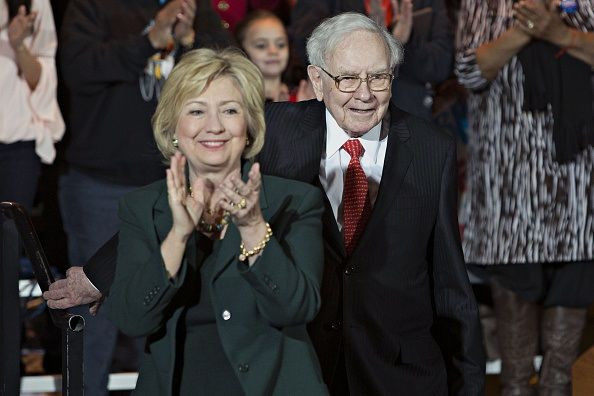Warren Buffett Raising Money For Hillary Clinton Amid Democrats’ Calls For Probe Into Mobile Home Business

This fall, even as Hillary Clinton demanded harsher punishments for financial crime, her campaign benefited from a fundraiser hosted by a Wall Street mogul whose investment fund had just been sanctioned by regulators. Now, Clinton is getting a fundraising boost from another financial titan — one who controls a firm that some Democratic lawmakers want investigated over its treatment of low-income and minority homeowners.
According to Politico, billionaire investor Warren Buffett is scheduled to host a $33,400-a-head fundraiser for Clinton and Democratic Party groups in Washington on Jan. 31, the day before the crucial Iowa caucuses. Buffett’s fundraiser for Clinton — which follows previous Clinton fundraisers he's appeared at — will occur just weeks after senior Democratic lawmakers on the House Financial Services Committee excoriated him over a joint report by the Seattle Times and BuzzFeed about a mobile home company owned by his investment firm, Berkshire Hathaway. The report alleged that Berkshire’s subsidiary, Clayton Homes, “systematically pursues unwitting minority homebuyers and baits them into costly subprime loans, many of which are doomed to fail."
The lawmakers say that if the report is accurate, the Buffett-controlled company engaged in “clear violations of federal fair lending and consumer protection statutes” when it pioneered “a disturbing business model that targets low- and moderate-income minority borrowers and that steers them into high-cost loans.”
“Clayton Homes offers homes and financing to all Americans regardless of their race, socioeconomic status or background,” the company stated in a press release last week. “We categorically and adamantly deny discriminating against customers or team members based on race or ethnicity.”
On Jan. 12, four Democratic lawmakers sent a letter to the Consumer Financial Protection Bureau requesting a probe of Clayton Homes and two of its subsidiaries. In their letter, the lawmakers said that last year, “the same Berkshire Hathaway companies, with Warren Buffett’s endorsement, successfully pressed Congress to pass legislation rolling back consumer protections” for those seeking loans for mobile homes. The lawmakers’ call for an investigation comes as Clinton competes for support from minority voters in key presidential primary states.
The Clinton campaign did not respond to International Business Times’ questions about the propriety of raising money from Buffett after her fellow Democrats requested the probe. Three of the four lawmakers who signed the letter — Reps. Maxine Waters of California, Emanuel Cleaver of Missouri and Michael Capuano of Massachusetts — have endorsed Clinton’s presidential bid, according to news reports. The other signatory, Minnesota Rep. Keith Ellison, has endorsed Clinton’s opponent, Vermont Sen. Bernie Sanders.
Buffett’s foray into presidential politics — and his bump up against a burgeoning Washington controversy over two businesses linked to him — contrasts with his image as the "Oracle of Omaha,” an elder statesman above the messiness of partisan politics. Buffett has called for changes to the tax code to address the fact that many wealthy investors like himself pay lower tax rates than regular Americans, like his secretary. His plea for Congress to raise taxes inspired “the Buffett rule,” a proposal from President Barack Obama to hike taxes on millionaires. But Buffett’s businesses have long intersected with the public policy arena — and some of them have a financial stake in various policies that will be overseen by the next president.
For instance, the Securities and Exchange Commission last month issued a report raising concerns about the major ratings agencies mimicking some of the behavior they engaged in during the leadup to the 2008 crisis. Should the report prompt a push for tougher regulations on the agencies, that could affect Moody’s — a major ratings agency in which Berkshire Hathaway is the largest institutional shareholder.
After the 2008 financial crisis, Buffett faced questions about why Moody’s gave high ratings to mortgage securities that were inherently risky, based on loans to customers disproportionately likely to default. The New York Times in 2009 noted that he was “uncharacteristically silent” about conflicts of interest at the agency “even though that conflict is especially glaring in his case because one of the companies that Moody’s rates is Berkshire.” An investigative report from McClatchy in 2009 found that in the leadup to the financial crisis, Moody’s was “purging analysts and executives who warned of trouble and promoting those who helped Wall Street plunge the country into its worst financial crisis since the Great Depression.” Buffett defended the ratings agencies and said they should not face punishment.
Buffett also has a potential interest in the outcome of legislative debate over whether to grant Puerto Rico the right to declare bankruptcy. That’s because Buffett’s firm invests in the bond insurance business — and according to Bloomberg News, it “is one of the insurers on some debt from Puerto Rico’s electric power authority, highway agency and infrastructure financing borrower.” Should Puerto Rico be permitted to declare bankruptcy and not pay back bondholders in full, it could affect Buffett’s insurance business.
In Congress, a Berkshire subsidiary, Berkshire Hathaway Energy, has been lobbying on a range of energy and environmental rules. Similarly, while Clinton was secretary of state, another Berkshire subsidiary — carpet manufacturer Shaw Industries — lobbied the State Department on issues like tariffs on foreign imports sold at below-market rates.
© Copyright IBTimes 2024. All rights reserved.






















